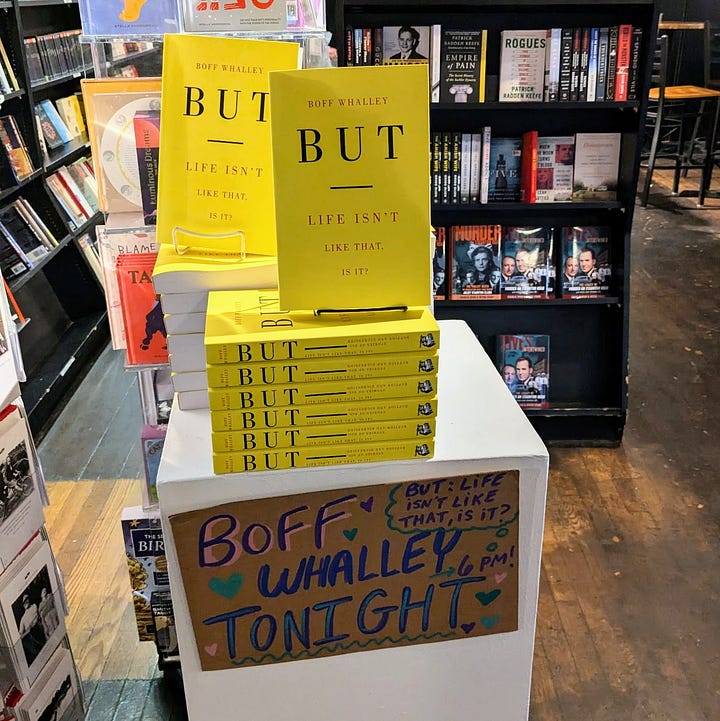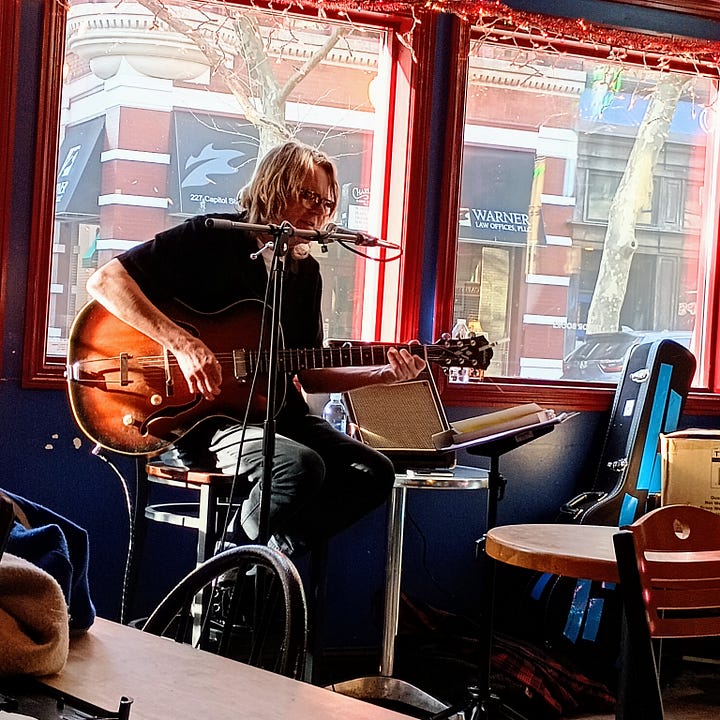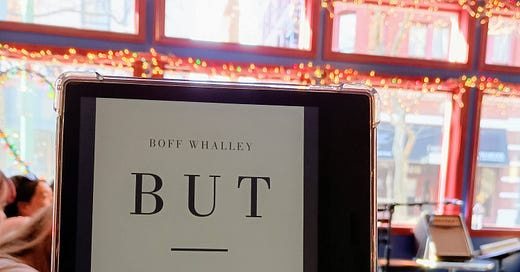Boff Whalley Book and Music Event
Ever since reading Black Coal and Red Bandanas, I have been following PM Press, the independent radical publishing house that published the book. When I got an email that PM Press was crowdfunding to publish Boff Whalley’s new book, But: Life Isn’t Like That, Is It?, I knew I wanted to be involved, so I joined the crowdfunding campaign. I was even more excited when the book tour stops were released and I found out that Whalley was coming to Charleston’s very own Taylor Books as part of the tour. As someone born in 1992, Chumbawamba’s Tubthumping is a very memorable part of my childhood, so my interest in Whalley sprung from him being one of the founding members of the anarcho-punk band (though I do like Commoners Choir, another of Whalley’s musical projects). However, through reading the book, I actually learned a lot about Whalley’s other projects and pursuits and developed a deeper respect for him.
The Book
Title: But: Life Isn’t Like That, Is It?
Author: Boff Whalley
Publisher: PM Press
Publication Year: 2025
ISBN: 9798887440958
Rating: 4 stars
Whalley is doing a lot of different things in this book (and I mean that in a good way), but the central thesis of the book and the idea where the title comes from is that as humans, we like a story structure and we are trained to see a story as something that has a beginning, a middle, and an end. However, no matter how much we wish it would be, life events usually don’t neatly fit into that kind of story arc. Using examples from his own life and events he has observed, Whalley demonstrates how the stories that make up real life are usually derailed from a neat beginning, middle, and end with a “but.”
Interspersed throughout, Whalley also has chapters on the “disruptors” in his life. These are people that came into his life and caused a major paradigm shift in a positive way. People who knowingly or unknowingly changed his outlook on everything and therefore were “buts” in his own story. In these chapters, he makes a point to meet and talk with these disruptors to thank them for their contributions to his life and discuss their work and the way it changed him. One of the thing he is always sure to do in these tête-a-têtes is ask his disruptors who their disruptors were to trace a chain reaction of how people can impact one another without even knowing it. These chapters led me to spend a lot of time thinking about who the “disruptors” in my life have been and how coming into contact with them has changed me for the better. I’m not ready to set off on a tour thanking them and writing about it, but it is a really interesting idea to think about and a weird but useful practice of gratitude.
In the book, Whalley has a lot of commentary on current events and politics that are in line with what you’d expect from a founder of an anarcho-punk band. For the most part, I agree with him on most of his views, but there were a couple of places where I felt like he was kind of down on ebooks and kind of stating that print books are better. While I do prefer a print book 90% of the time, and I do know that because ebooks are so tied up with Kindle and Amazon and Jeff Bezos, they can be problematic, I just can’t take an elitist attitude against ebooks. In fact, I read this book in an ebook format. While ebooks have drawbacks in terms of requiring electricity to be able to read and being much harder to share, they have made reading so much more accessible to a lot of readers that were previously left out by print books. People with limited mobility or transportation can easily borrow ebooks from their library without leaving their home; people with reading difficulties or vision related disabilities can adjust the font in ways that make it easier for them to read (and some ereaders will even read aloud); people trying to broaden their vocabulary benefit from the built in dictionaries. In the instance that stands out most in my mind, Whalley is talking about marginalia and how it turns reading from a passive experience into an active experience—a lecture into a conversation, but I can still make notes and annotations on my Kindle—in fact whether I’m reading on my Kindle or my iPad, I’m more willing to annotate an ebook because I don’t feel like I’m damaging an actual book. However, some of this might be generational as well. I’m thirty years younger than Whalley and grew up in a different technological landscape, which might impact our individual outlooks. Of course, all that said, at the end of the event I had nothing to ask Whalley to sign, so maybe he’s getting the last laugh here.
The Event


The event was part reading, part concert. Whalley read some excerpts from the book and retold some of the stories and then followed each section/topic with a song from his career related to what he had just discussed. He said that originally his idea for this book tour was to write new songs to go along with the book, but he quickly realized that he had already written songs based on all of the topics he wanted to talk about, so just dusted off some great songs from the past and performed them.
A part of the talk that I really enjoyed that wasn’t as explicitly discussed in the book is the humor and fun that Chumbawamba and Whalley’s other projects bring to their ideals. As an anarcho-punk band they have some big and serious takes on major issues like capitalism, politics, climate change, etc. The band started in Margaret Thatcher’s UK and their reactions to what was happening in the UK at the time figured into their early music. Because they were talking about such serious issues, they felt like they had to have a serious demeanor and presentation. However, eventually, they realized no one in the band liked putting on that kind of act and they allowed their natural humor and sense of fun to come through more in their music and their performance. That is one of the things I really like about the music—it’s talking about real issues, but it talks about them in a way that doesn’t feel soul crushing. I think that, in and of itself, is an act of resistance.
When Whalley was done, he opened it up for questions. It seemed like maybe a lot of people in the audience hadn’t read the book yet, but there were plenty of fans with questions related to other aspects of Whalley’s career and life. A man probably in his forties said he didn’t know what “THE song” Whalley kept referring to was. I’m not sure if that was a sneaky way to try to get Whalley to perform Tubthumping for us or if this man who was clearly alive in the late 90s somehow managed to miss a song that was all over the place and played on the radio every hour. Whalley didn’t play the song and I’m still wondering if the question was genuine or an April Fool’s joke.
It was a very nice evening and I thoroughly enjoyed getting to hear Whalley talk more about the events he wrote about in the book as well as other moments. He was engaging and funny and the musical portion of the evening added an extra umph to the event. This is a fun book tour and I recommend going out to see it if it comes to a bookstore near you!



